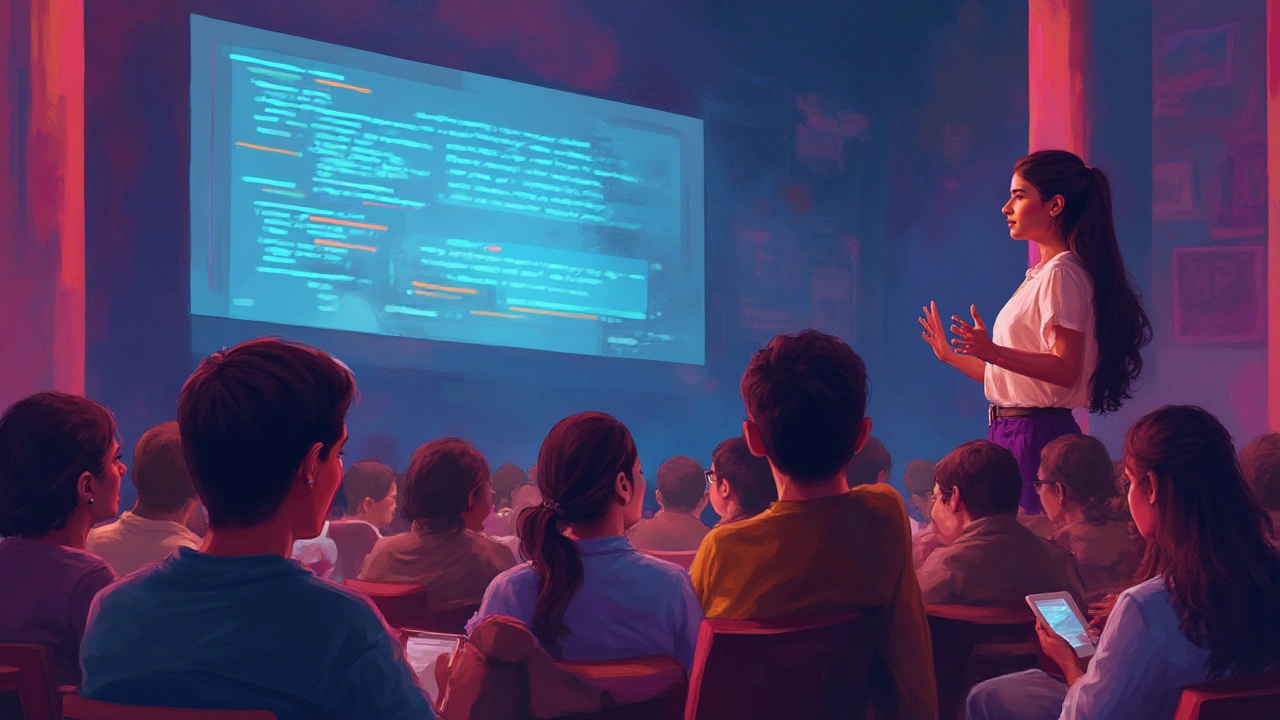Skilled people always have it easier. Employers chase them. Startups want to hire them first. Even freelancers with the right talents get work in a snap. But the tricky part is knowing what skill actually tops the list today. The world changes fast, and the most wanted skill last year can slip down the charts quickly. Still, if you follow the money, check recruitment data, and listen to employers across India, the US, and Europe, one skill stands out above the rest right now—and maybe it’s not what you think.
Cracking Today’s Job Market: Why Demand for Skills Shifts So Fast
The speed of change in the job market is almost dizzying. Think about this: In 2020, people were talking about artificial intelligence (AI) and data science as the next big thing. By mid-2025, job portals across India, Singapore, and the US confirm that just knowing a bit about these fields is not enough anymore. Now, candidates who can actually build, train, and understand AI models are scooped up almost instantly.
But why does demand shift so quickly? Part of the answer is technology itself. Take a look at how, in 2022 alone, nearly 150,000 jobs in India’s IT sector vanished as roles in support and maintenance dwindled. But that same year, companies like TCS, Infosys, and global firms in Bangalore hired twice as many AI specialists and machine learning engineers. The market chases people with deep, practical know-how instead of just textbook knowledge.
The most eye-opening part: Many of these shifts happen almost overnight. A McKinsey report from early 2024 mentioned that 60% of businesses worldwide were automating routine jobs, meaning millions needed to upskill or switch careers. Chennai’s startup scene is a great example. Last year, when generative AI exploded, every second startup was desperate for someone who could build chatbots, automate tasks, or code AI-driven features without much delay. People with this modern skillset found jobs faster and got giant pay hikes—some up to 40% higher than typical tech jobs, according to Naukri.com salary data.
But demand doesn’t just follow what’s trending online. It’s about what really solves problems for companies. For instance, cloud computing sounded futuristic ten years ago. Now, even small businesses use it daily. That’s why IT roles change fast: Businesses expect quick results, and if you can deliver, you’ll be miles ahead.
The Most In-Demand Skill in 2025: AI & Machine Learning Mastery
Cut through all the hype, and the answer is clear: The most in-demand skill for 2025 is mastery in Artificial Intelligence (AI) and Machine Learning (ML). Not just theoretical understanding, but hands-on, practical skills.
Why? AI and machine learning now sit at the core of everything—finance, healthcare, ecommerce, logistics, marketing, and even digital art. For example, banks use AI-powered engines to catch fraud faster than any manual process ever could. Hospitals automate patient records, predict disease outbreaks, and optimize workflows with machine learning algorithms. Retailers use smart recommendation systems to boost sales and personalize ads in real time.
If you’re not convinced, look at these numbers:
| Industry | Percentage of Hiring Job Roles Requiring AI/ML Skills |
|---|---|
| IT & Software Services | 72% |
| Finance & Banking | 63% |
| Healthcare | 59% |
| Ecommerce | 55% |
| Manufacturing | 40% |
What separates an in-demand candidate from the rest isn’t just chasing buzzwords or taking short courses. You need to actually build things—recommendation engines, fraud detection systems, chatbots, automated analytics dashboards. Recruiters want portfolios packed with completed projects, not just certificates.
Recently, The Economic Times quoted the CTO of a top Indian unicorn startup:
“The race is not just about knowledge, but the ability to build, experiment, and scale AI in production. We pay a premium for anyone who knows TensorFlow, PyTorch, and can actually deliver on live projects.”This gives a real edge to those who get serious: The top 10% of machine learning engineers in India in 2025 are now out-earning software developers by at least 30%—sometimes much more.
Companies now expect job seekers to master everything—from designing neural nets to understanding ethical AI, from cleaning big data to deploying scalable apps with cloud services. The most in-demand skill isn’t just a buzzword. It’s the proven ability to get AI and machine learning working, at scale, and with real business results.

Beyond Hard Skills: Why Soft Skills Matter Even More
Here’s the twist: Even AI experts lose out if they can’t work with others, explain their ideas, or adapt to fast-changing challenges. While coding and technical know-how open doors, recruiters often say it’s soft skills that help you climb higher. Creativity, adaptability, problem-solving, and communication—these are almost as urgent as hardcore technical chops.
A 2024 survey by LinkedIn among Indian hiring managers revealed something surprising. Over 80% said they would pick an average coder with top-notch team skills and creative thinking over a “brilliant loner” who can’t collaborate or handle feedback. Why? Because real-world problems in AI and tech never arrive in clear, simple packages. You need to talk to colleagues from marketing, management, design, and even legal. You have to translate data insights into plain English. When a system fails, you’ll often need to present fixes to a non-technical boss or client. These are where soft skills shine.
Adaptability deserves a special mention. New tools pop up every few months. Last year’s “hottest” platform might be replaced by something sleeker or smarter. So, people who keep learning, pick up trends quickly, and never stop experimenting become the most valuable. That means enrolling in new courses, teaming up for hackathons, joining communities, or tackling problems outside your comfort zone.
Want to stand out? Don’t just stack up certificates. Practice explaining the latest AI trends to a friend, take part in group projects, or offer to help out in cross-functional teams at your workplace. This is the combination that gets you noticed—and promoted.
Building Your Roadmap: Tips to Master the Most In-Demand Skill
So how do you get there? Here’s a no-nonsense action plan to climb to the top of the hiring list in 2025:
- Specialize with Depth: Pick a practical AI focus: NLP, computer vision, or deep learning. Get good enough that you can build and deploy a live product, not just finish online quizzes.
- Portfolio Over Certificates: Create a GitHub with solid, real-world projects: AI chatbots, apps analyzing real data, or creative problem solvers. Show you can move from an idea to a functioning result.
- Master the Tools: Learn and practice with TensorFlow, PyTorch, cloud AI services like AWS or Azure, pandas, and scikit-learn. The tools change, but if you’re good at picking them up, you’ll always be ahead.
- Keep Soft Skills Sharp: Volunteer for team roles, organize knowledge-sharing sessions, or even teach kids or beginners. Storytelling, patience, and listening matter.
- Stay In the Loop: Join AI forums, attend webinars, watch real-world case studies, and hang out where industry experts share news—not just tutorials. Sites like arXiv, Medium, and Discord AI channels help you follow fresh trends.
- Real-World Learning: Apply your skills in internships, freelancing, or collaborative hackathons. You’ll learn more from a weekend project than ten hours of watching videos alone.
- Don’t Fear Failure: The best AI and machine learning experts admit their first real “production” builds broke, crashed, or underperformed. Treat mistakes as feedback, not defeat.
- Ethics & Responsibility: Companies are now checking for awareness of data bias, privacy, and transparency. If you talk confidently about ethical AI, you set yourself apart from the crowd.
- Network Like a Pro: Most of the juiciest jobs never get advertised. Connect with peers on LinkedIn, message recruiters, join local tech events, or reach out to Chennai’s AI community. Sometimes, a quick hello opens doors.
- Maintain Balance: Don’t burn out. Make time for hobbies or health. The freshest ideas often come when your brain is relaxed and off the clock.
Wondering if all this effort is worth it? Consider this: According to an April 2025 survey by Indeed, the average salary for machine learning engineers in metros like Chennai, Bangalore, and Hyderabad reached ₹19-30 lakhs per year, while star performers at unicorns and global firms bagged double—sometimes even more with remote contracts for US and Europe. The urgency to master AI and machine learning has never been greater.
If you’re aiming higher, don’t focus just on learning for its own sake. Build, share, explain, and connect. Bring together sharp technical skills and genuine people skills. That’s how you’ll stay at the very center of what the world truly needs and values right now.
